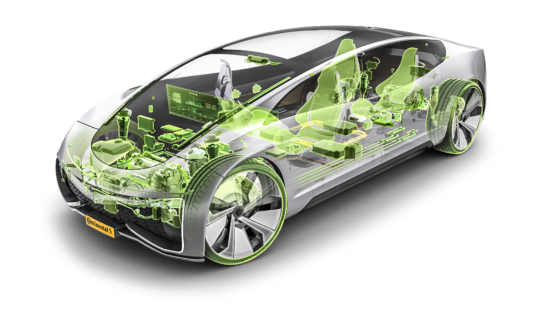Continental’s electric vehicle work to be carbon-neutral by 2022
 From 2022 Continental will make its global business for emission-free cars, buses, trains and other vehicles carbon-neutral (Photo: Continental AG)
From 2022 Continental will make its global business for emission-free cars, buses, trains and other vehicles carbon-neutral (Photo: Continental AG)
Entire business to be carbon-neutral by 2050
Continental AG is aiming to be completely carbon-neutral by 2050. One of the earliest landmarks in the plans sees Continental move to being carbon-neutral in some areas within two years. Specifically, from 2022 Continental will make its global business for emission-free cars, buses, trains and other vehicles carbon-neutral. The programme covers the company’s production processes as well as their upstream stages and recycling at the end of use. In this way, the technology company is helping the industry make emission-free mobility completely carbon-neutral.
According to the company, the carbon-neutral vehicles initiative is just one of the first stages of Continental’s comprehensive roadmap for sustainable business practices, which aims to achieve 100 per cent carbon neutrality, 100 per cent emission-free mobility and industry, a 100 per cent circular economy and 100 per cent responsible value chains – all by no later than 2050. As Dr Ariane Reinhart, Executive Board member for Human Relations and Sustainability at Continental says, the company is “decisively pursuing the transformation to a sustainable economy”:
“This is the decisive benchmark for us and for the entire mobility industry. While we don’t yet have all the solutions, we are establishing a framework for ourselves and our partners. Sustainability has long been one of the key drivers of innovation at Continental, but now we are taking a major step forward and making it an integral part of our strategy. With our roadmap, we are laying a solid foundation for sustainability like no other company in the supplier industry to date. This will enable us to generate additional profitable growth and competitive advantages. Sustainable business is the future. It is both an expression of an inner attitude and a forward-looking way of thinking. For this reason, the associated milestones are already firmly established in the long-term remuneration system of the Executive Board and managers.”
“The path to carbon-neutral mobility is a combination of sprint and marathon”, Dr Steffen Schwartz-Höfler, head of Sustainability at Continental.
But in the words of Dr Steffen Schwartz-Höfler, head of Sustainability at Continental, “The path to carbon-neutral mobility is a combination of sprint and marathon.” For Continental this means: “It is a sprint in the sense that the entire emission-free vehicles business must be made carbon-neutral across the globe, and a marathon in view of the technological developments required to support the rapidly growing future market of emission-free mobility.”
In short, there are three main goals:
- As of 2020, all electricity procured by the company originates from renewable sources;
- By 2040, all production processes are to be made carbon-neutral; and
- By 2050 at the latest, Continental aims to be carbon-neutral across its entire business, from one end of the value chain to the other.
The Science Based Targets initiative (SBTi) has confirmed that Continental’s recently-released roadmap is in line with Paris climate goals. “To achieve the Paris climate goals, two things are necessary: a complete shift to emission-free mobility and a fully carbon-neutral business,” explained Schwartz-Höfler.
In the meantime, the latest Continental Mobility Study confirmed that there is a growing trend toward emission-free electric mobility. In Germany, where reservation persist (but are slowing), one in three people can currently imagine buying an electric car. In China, the world’s largest car market, as many as 86 per cent of people are considering the idea. Until now, however, some criticism of emission-free driving has been sparked by the fact that the production of the vehicle components themselves is currently not carbon-neutral. At present, a third of people in Germany say they would not consider buying an electric car for this or similar reasons, with many doubting that the technology is environmentally friendly. In France, a quarter say the same thing. The situation is entirely different in the USA, Japan and China, meanwhile, where the percentage of those who doubt the ecological credentials of electric cars is much lower, ranging from 11 per cent in the USA to just 1 per cent in Japan.
While Continental’s actions represent leadership towards a global sustainable economy, the company’s human resources head (Dr Ariane Reinhart, Executive Board member for Human Relations and Sustainability at Continental, pictured) also warned that “An electric car has a lower employment density than a conventional car” (Photo: Continental AG)
As far as Conti’s Zero Tailpipe Emission Vehicles (ZTEV) programme is concerned, the crucial first step is: neutralizing CO2 output through “negative emissions”. This means generating equal, so-called negative emissions mainly by planting of trees and other options associated with the restoration of ecosystems. Neutralization will be calculated on the basis of the verified CO2 figures in the latest sustainability report and the annual report. Details of which partners Continental will be working with towards the neutralisation goal are set to be released during the next year.
And nothing as revolutionary as what Continental is describing can be achieved without a cost. In this case, as Continental announced in September 2020, 30,000 job losses worldwide will be an unavoidable reality. As Dr Ariane Reinhart told the Financial Times: “An electric car has a lower employment density than a conventional car”, adding: “We cannot compensate for it in terms of employment”.


 Autodoc; Dirk Dehmel
Autodoc; Dirk Dehmel

Comments